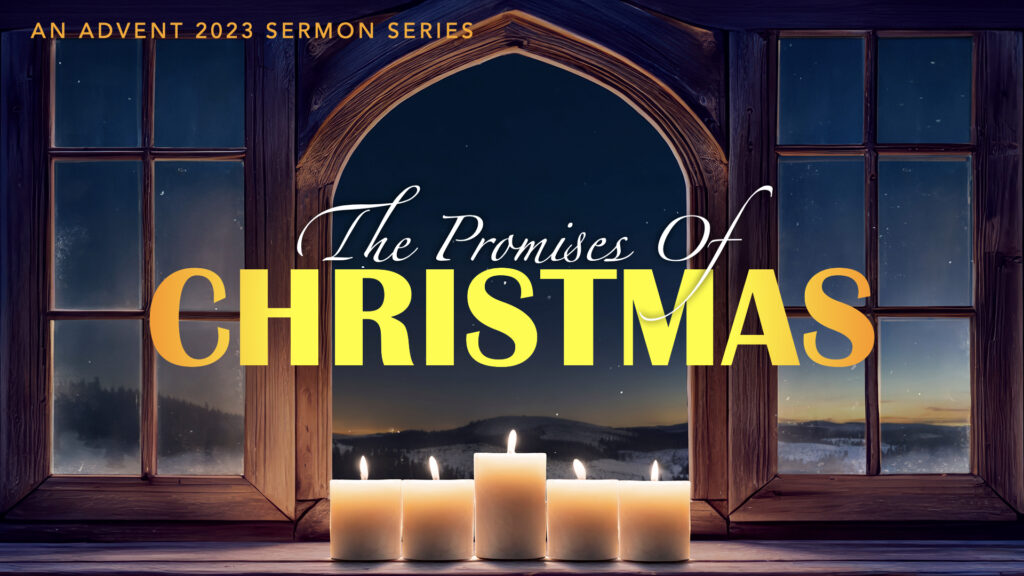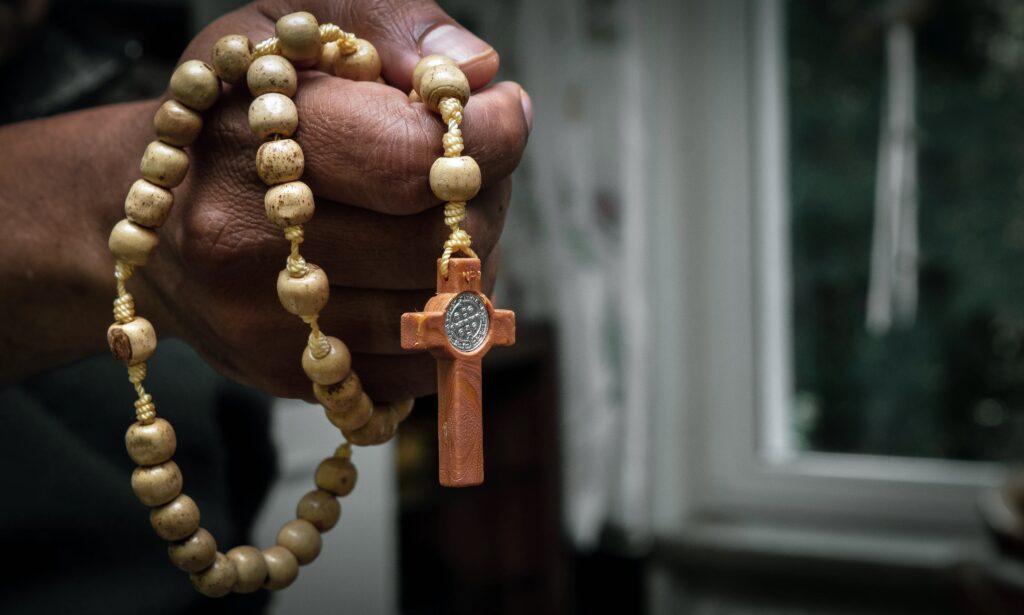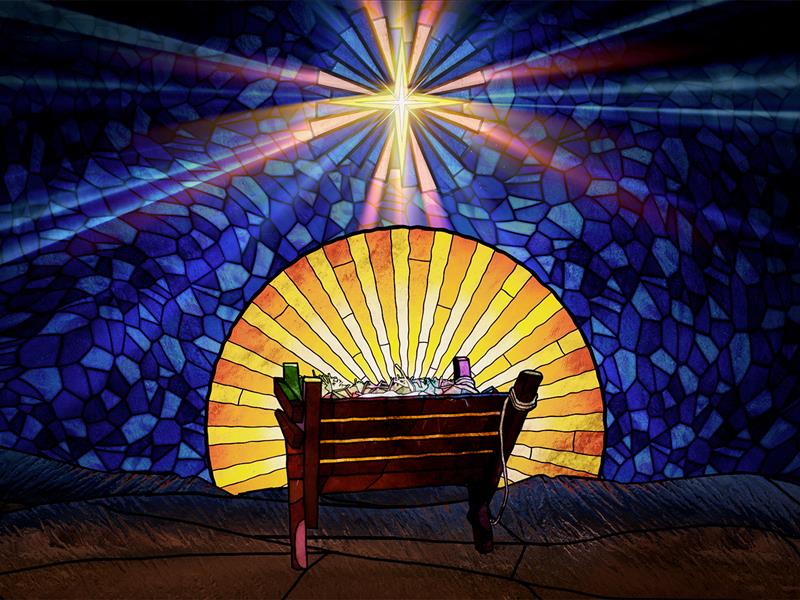
December 2023 Pastor’s Corner — A Season of Promise

“Behold, the days are coming, declares the LORD, when I will fulfill the promise I made to the house of Israel and the house of Judah. In those days and at that time I will cause a righteous Branch to spring up for David, and he shall execute justice and righteousness in the land. In those days Judah will be saved, and Jerusalem will dwell securely. And this is the name by which it will be called: ‘The LORD is our righteousness.’” — Jeremiah 33:14-16
Advent is one of the most popular seasons in the church calendar, it’s certainly one of mine. Of course, culturally its popular because it means Christmas is coming and most of us look at Advent as a time to prepare for the celebration of that holiday. But there is a depth and richness to Advent, an irony even, that runs much deeper than merely getting ready for Christmas. “Advent” is a Latin word that means “coming” or “arrival.” Yes, it is a season of preparing to celebrate Christ’s first coming 2,000 years ago, but even more it is a season of preparation for Christ’s return. This dual focus makes Advent a season of promise — promise fulfilled and promise yet to come.
As foretold in Jeremiah (and Isaiah and the other prophets), the incarnation of Jesus Christ was the fulfillment of God’s promises to redeem His people from sin and exile and restore His Kingdom on earth in a fuller and more beautiful way than ever before. As the New Testament makes clear, every one of God’s promises about the Messiah were fulfilled in Jesus Christ. Every single one. We can spend our entire lives contemplating the wonder of God’s promises fulfilled in the incarnation of Christ and find there’s always more depths to explore, which is why Advent is necessary to help us prepare to celebrate the birth of our Savior.
What no one expected, though, was that the birth, life, and death of Jesus Christ was just the beginning, the inauguration, of that work. The completion and consummation of that work is yet to come, which is why we use this season to prepare for the glorious return of our Savior. As certainly as He came the first time, He will surely come again. The guarantee of His return is that He has already come, let alone how many times He said He would return (Matthew 16:27; Luke 12:40; John 14:3; Acts 1:11; Revelation 22:20, to list just a few). A full and complete celebration of Advent and Christmas not only looks back, but also looks ahead, anticipating the joyous return of our Savior and the consummation of the Kingdom of God.
Advent is the season that shines brightly the hope, love, joy and peace of Jesus Christ in the darkness of this world. The irony of Advent is this: as cold of winter sets in and the leaves fall and flowers die, as the dark of winter grows longer each day, Advent reminds us that death has been defeated (1 Corinthians 15: 54-57) and the Light of Jesus Christ continues to shine forth and can not be overcome (John 1:1-14). God will be faithful, and the promise of this season will bear fruit. So this Advent, hold fast your hope. Love, because He first loved us. Rejoice in your salvation now and your salvation yet to come. Rest, knowing that God has brought you peace, even in the midst of your enemies.
Let us draw near with a true heart in full assurance of faith, with our hearts sprinkled clean from an evil conscience and our bodies washed with pure water. Let us hold fast the confession of our hope without wavering, for he who promised is faithful. And let us consider how to stir up one another to love and good works, not neglecting to meet together, as is the habit of some, but encouraging one another, and all the more as you see the Day drawing near. — Hebrews 10:22-25
Blessings,
Rev. David Garrison
Read more...

October 2023 Pastor’s Corner – Uniquely Christian

“For if you love those who love you, what reward do you have? Do not even the tax collectors do the same? And if you greet only your brothers, what more are you doing than others? Do not even the Gentiles do the same?”
— Matt. 5:46-47
There’s a prayer that pops up in my daily devotional (Seeking God’s Face by Philip Reinders, if you’re interested) every few days: “for God to equip us to serve in uniquely Christian ways in the public arena.” Praying for God to help us to serve in “uniquely Christian ways” seems such an obvious and unnecessary thing, doesn’t it? And yet, over the past several months, this particular prayer has needled away at the back of my mind.
The hard truth most of us probably don’t want to admit is that there is very little that is “uniquely Christian” in how we go about our daily lives. When it comes to living as a Christian, long as we’re generally nice to others, basically good in most respects, and overall relatively happy and content in our lives, we figure we’re doing pretty good. And there’s nothing wrong with any of those things. Most every person should attempt to live that way. But that’s just the thing. Most every person does live that way. There is nothing wrong with that, but there’s nothing uniquely Christian about it either. If that’s the extent of our witness, of how we represent the hope and joy of the Christian life to others, it’s not all that surprising that people aren’t interested in learning more about the good news of the Gospel of Jesus Christ.
It’s pretty clear from Scripture that there is supposed to be something about how we live our lives that is fundamentally and uniquely different from how the rest of the world lives. Consider what Paul writes: “Now this I say and testify in the Lord, that you must no longer walk as the Gentiles do, in the futility of their minds.” (Eph. 4:17) For the Hebrews, there were only two kinds of people: Hebrews and Gentiles. “Gentile” is simply a name for someone who is not Hebrew. But when Jesus and Paul, and the other New Testament writers, use the term, it’s more helpful to think of it as “people who don’t believe in Jesus.” So Christians aren’t supposed to live their lives the same way non-Christians do. But what does that look like? Paul continues, “put off your old self, which belongs to your former manner of life and is corrupt through deceitful desires, and to be renewed in the spirit of your minds, and to put on the new self, created after the likeness of God in true righteousness and holiness.” (Eph. 4:22-24)
What does living and serving in uniquely Christian ways look like? Pretty much every book of the New Testament talks about this, but a great place to start is the Sermon on the Mount in Matthew 5-7, a portion of which is quoted above. In summary, Jesus says that a uniquely Christian life is one that seeks reconciliation with others, honors the image of God in all people, is a person of their word, turns the other cheek instead of seeking retribution or revenge, loves their enemies, gives generously to those in need, seeks God in all things without flaunting their faith in front of others, radically trusts God in the present and in the future, focuses first on personal holiness rather than judging what’s wrong in others. There’s obviously a lot of nuance in what Jesus says that I just skipped for the sake of summary, but you get the gist. Another great place to continue your study of what it means to live and serve in uniquely Christian ways is to read the rest of Ephesians 4, which we looked at in the previous paragraph. Start with Ephesians 4:17, and read through the end of chapter 5.
As followers of Christ, our lives ought to be fundamentally different than those who don’t follow Christ. Peter writes, “…in your hearts honor Christ the Lord as holy, always being prepared to make a defense to anyone who asks you for a reason for the hope that is in you; yet do it with gentleness and respect, having a good conscience, so that, when you are slandered, those who revile your good behavior in Christ may be put to shame. For it is better to suffer for doing good, if that should be God’s will, than for doing evil.” (1 Pet. 3:13-17) Our very way of interacting with others and the world around us, the love we extend to each and every person, the faith we hold on to, the hope that secures us, should be captivating and intriguing to those who don’t know Jesus. We are called to be different.
Take some time to look at yourself and your life. How are you serving and living in uniquely Christian ways? What might need to change so that you reflect Christ more clearly and brightly to those around you. These are great questions for any Christian to ask, at any point in their walk with the Lord.
“You are the light of the world. A city set on a hill cannot be hidden. Nor do people light a lamp and put it under a basket, but on a stand, and it gives light to all in the house. In the same way, let your light shine before others, so that they may see your good works and give glory to your Father who is in heaven.”
— Matt. 5:14-16
Blessings,
Rev. David Garrison
Read more...

July 2023 Pastor’s Corner – Priceless

“The kingdom of heaven is like treasure hidden in a field, which a man found and covered up. Then in his joy he goes and sells all that he has and buys that field.
“Again, the kingdom of heaven is like a merchant in search of fine pearls, who, on finding one pearl of great value, went and sold all that he had and bought it.”
— Matt. 13:44–46
Much like a pearl inside an oyster, sometimes the greatest and most profound truths come in the pithiest of sayings. These two sayings of Jesus are definitely fantastic examples of that. They are very simple parables that are easy to grasp and understand. And yet, just like the point they are making, there is so much more within once we slow down and enter the story.
Imagine yourself as the man or the merchant. Smell the soil of the field or the salty water where the oysters are. Visualize coming across the treasure in the field — did you have to dig to find it, or was it poking out of the ground? What was it about the pearl that caught your eye as it sat under the water? What could possibly be found in that treasure, how large must that pearl have been, to motivate you to (don’t miss this) sell everything you have in order to purchase the field or the treasure? Not just doing that, but doing it with great joy and excitement? Take a moment more — when was the last time you felt that kind of joy about, well, anything? Honestly, this is a ridiculous story, almost ludicrous. No one in their right mind would actually do anything like that, right? Which is exactly the point, but not the entire point.
Now consider what Jesus says is the treasure hidden in a field and the pearl of great value. Jesus is talking about the kingdom of Heaven. Often, we think the treasure being spoken of is salvation, which it is. But it’s also so much more. The treasure that’s worth more than anything else in our lives is more than just accepting Jesus Christ as your savior, it’s embracing the way of life that Jesus introduced to us and the world. Walking in the way of Jesus — loving God with all our being (Matt. 22:37-38), loving our neighbors as ourselves (Matt. 22:39), loving even our enemies and praying for those who persecute us (Matt 5:43-48), living a life of Christ-like service to the rejected and hurting (James 1:27), resting in the grace of Christ (Matt 11:28-30) — that is the treasure beyond all value. That is worth more than all of our earthly possessions or dreams.
The apostles and countless saints throughout the centuries have experienced the truth of these parables. Paul experienced this so viscerally he proclaims, “Indeed, I count everything as loss because of the surpassing worth of knowing Christ Jesus my Lord. For his sake I have suffered the loss of all things and count them as rubbish, in order that I may gain Christ.” (Phil. 3:8) Most of us, though, are scared off by that idea. As Brennan Manning once said, “We want to draw close enough to the blazing inferno of the love of God that we stay warm, but not so close that we might get burned.” It makes you wonder if we’re missing something, doesn’t it?
As we continue through this summer, be intentional in reflecting on your walk with the Lord. Have you found your relationship with Jesus to be a treasure worth selling everything you have to gain? What is holding you back from knowing Jesus so well that everything else becomes “rubbish”? How would it actually feel to let yourself be burned by the blazing inferno of the love of God? There’s more to this life than just living and dying, waking and sleeping. Jesus didn’t die on the cross so you could merely be forgiven of your sins and receive the promise of eternal life, He meant for you to have more and better life than you’ve ever dreamed of (John 10:10), and that life is best found and pursued together (Hebrews 10:24-25).
Restore to me the joy of your salvation, and uphold me with a willing spirit.
— Psa. 51:12
Blessings,
Rev. David Garrison
Read more...

January 2023 Pastor’s Corner — Liminal Spaces

…but [Jesus] holds his priesthood permanently, because he continues forever. Consequently, he is able to save to the uttermost those who draw near to God through him, since he always lives to make intercession for them. — Hebrews 7:24–25
Liminal is from the Latin word limen, which means threshold. A liminal space is the time between ‘what was’ and ‘next.’ We see and experience liminal spaces in all sorts of ways, some more obvious than others. Examples of liminal spaces include turning the calendar to a new month or year, the solstices and equinoxes, sunsets and sunrises, the shore (being the threshold between sea and land). The picture above captures several liminal spaces at once — the beach at the transition from low to high tide at sunset. Many religions, such as the druidic religions of medieval England, make a big deal about these liminal spaces, believing that they are places and times where the veil between heaven and earth is particularly thin, thus allowing better access to the gods and the afterlife.
The idea of liminal spaces is something that we recognize intuitively, if not consciously. We are drawn to liminal spaces like the beach, because something about it makes us feel closer to God. We make new years resolutions each year because we see the start of the year as an opportunity for a “new beginning.” We try to take advantage of these times and spaces because we hope they will enable us to reconnect with, draw near to, or simply grow deeper in our relationship with God. But what we learn from Jesus Christ and Scripture takes the idea of liminal spaces and simultaneously transforms it and deconstructs it.
Jesus Christ has transformed liminal spaces by making our entire faith, at least at this time, a prolonged spiritual liminal space. When Christ died on the cross and rose from the dead, He inaugurated the Kingdom of God. However, the Kingdom of God will not be fully consummated until Christ returns at the end of the age. Until then, we live on the “threshold” of the Kingdom of God. The Kingdom of God is already here, but it is not yet here. Martin Luther speaks of our walk with God as a liminal space when he says that we are at once justified and yet still sinful; we are both sinner and saint. Paul describes this tension so well in Romans 7:7-25. The life of faith itself is a liminal space, between what was and what is next.
However, Jesus Christ has also deconstructed liminal spaces and times. We don’t need to find liminal spaces and times in order to draw near to God. When Jesus died on the cross, “the curtain of the temple was torn in two, from top to bottom. And the earth shook, and the rocks were split.” (Matt. 27:51) The curtain in the temple separated the Holy of Holies, the place where heaven touched earth and the high priest would commune with God. It was a liminal space. Because of Jesus Christ, the barrier between us and God has been removed. Thanks to the presence of the Holy Spirit, we don’t need liminal spaces or times in order to draw near to God because God is always near to us and with us. That is the promise of Emmanuel, “God with us.”
This year is a little bit unique. On January 1, we not only start a new year and a new month, but also a new week. It’s quite natural to want to take advantage of this particular liminal time to commit to some changes. There’s certainly nothing wrong with making new years resolutions. However, don’t forget that, as our Scripture above reminds us, we do not need liminal times and spaces in order to draw near to God, because Jesus Christ has already done everything needed for us to do so. We are able to draw near to God any time, any where, because He has already drawn near to us.
Submit yourselves therefore to God. Resist the devil, and he will flee from you. Draw near to God, and he will draw near to you. Cleanse your hands, you sinners, and purify your hearts, you double-minded. — James 4:7–8
Blessings,
Rev. David Garrison
Read more...

December 2022 Pastor’s Corner — Christmas Tradition

“The tradition I handed on to you in the first place, a tradition which I had myself received…”
— 1 Cor. 15:3
Of all of the seasons of our lives, the one most rooted and grounded in tradition is Christmastime. Every family does the Christmas season differently, and every family is convinced their way is the right way! There’s the right time to put the tree up, the right way to do the decorations, the right way to hang the lights, the proper time for Christmas dinner, and, of course, the correct way to open the stockings and the presents. For many of us, it just doesn’t feel like Christmas unless the traditions are maintained and practiced correctly. And there’s absolutely nothing wrong with that!
In fact, “tradition” plays an important role in our lives, beyond just Christmas. Traditions help ground us in our lives; they provide a way to make sense of how the world works and where we fit into the world. Sociologists call this a metanarrative, a “big story.” That “big story” becomes explicit during the holidays, but is always there, whether we’re intentionally thinking about it or not. In fact, the Bible is very clear that the traditions of our faith are very important tools for helping us understand our faith, how to live out our faith, and how to pass our faith to others. The traditions aren’t the end in and of themselves. They are there to help us see the deeper life of faith to which Christ is inviting and calling us, signposts that remind us of what God has done in the past, is doing in the present and what He has yet to do in the future.
Over the course of Advent this year, we’ll be looking at the various parts of our Christmas Tradition. While the details are different for everyone, in general we all have particular traditions to help us prepare for the season, to get into the spirit of the season, lights that brighten the season for us, songs that carry the season into our hearts, ways of celebrating and rejoicing in the season, and the joy of presents given and received. All of these traditions help us delight in all that Christmas offers, but are also meant to point us past the holiday itself in order to remind us that, just as Jesus Christ took on human flesh 2,000 years ago in his First Advent, He will just as surely return for his Second. Celebrate how the world and history changed 2,000 years ago. But don’t lose sight of that for which we all deeply long: His imminent and certain return.
“I, Jesus, have sent my angel to testify to you about these things for the churches. I am the root and the descendant of David, the bright morning star.” The Spirit and the Bride say, “Come.” And let the one who hears say, “Come.” And let the one who is thirsty come; let the one who desires take the water of life without price. — Rev. 22:16–17
Blessings,
Rev. David Garrison
Read more...

September 2022 Pastor’s Corner – Left On ‘Read’

“O LORD, rebuke me not in your anger,
nor discipline me in your wrath.Be gracious to me, O LORD, for I am languishing;
heal me, O LORD, for my bones are troubled.My soul also is greatly troubled.
But you, O LORD—how long?” (Psa. 6:1–3)
If you are looking for a way to annoy a teenager (and really, who isn’t? It’s so much fun!), one of the best ways is to read a text they send you and not respond to it. This might be a trick that only works on iPhones, but here’s the basic idea. iPhones can send a status update for texts sent to other iPhones, letting the sender know when the message was delivered and read (you can see an example in the picture, look below the text bubble that says “on”). It absolutely drives my daughter crazy when I read her text messages and don’t reply promptly. It upsets her because she knows I’ve received her message, and I’ve even read it, but I haven’t yet answered her. The first time she called me out on it, she exclaimed, “Dad, you left me on ‘read’!” I had no idea what she meant until she explained it to me. While that time was accidental, I now do it all the time, just to annoy her.
The thing is, though, I always respond to her messages, but I don’t always do so via text. I might wait until the next time I see her. I might choose to respond with actions instead of words. I might respond to the text message with an email or a phone call. Sometimes, I’ll respond through her mother or brother. I don’t actually do this to annoy her (most of the time), but because I think those might be better or more efficient ways to respond in the moment.
This has been on my mind lately, because I think there are a lot of times when it feels like God has left us on ‘read.’ We pray, but we don’t hear an answer… or maybe the better way to say it is that we don’t receive an answer from Him in the way we would prefer. If my daughter texts me, she would like a text message back. Promptly. Sometimes, God answers our prayers in very different ways from what we might prefer or desire. Sometimes, He answers our prayers weeks, months, sometimes even years after we lift them up to Him. We know God hears our prayers, the Psalms remind us of that all the time (see Psalm 3:4, 4:3 17:6, 55:17, and 116:1), but it seems like God leaves us on ‘read’ when He doesn’t answer our prayers when or how we would like.
But God does, in fact, always hear our prayers. And He always answers them. Our task is to trust in Him and wait patiently for His answer. His timing is always perfect, and His methods are precisely what we need. The question is, when God seemingly leaves us on ‘read,’ will we continue to trust in Him?
I waited patiently for the LORD; he inclined to me and heard my cry. He drew me up from the pit of destruction, out of the miry bog, and set my feet upon a rock, making my steps secure. He put a new song in my mouth, a song of praise to our God. Many will see and fear, and put their trust in the LORD. — Psalm 40:1–3
Blessings,
Rev. David Garrison
Read more...

June 2022 Pastor’s Corner – Change

“In this world nothing can be said to be certain, except death and taxes.” — Ben Franklin
“Jesus Christ is the same yesterday and today and forever.” — Hebrews 13:8
The past several years has taught us how quickly things can change, and change drastically. Some of these changes have been good, many of them have been difficult, if not very hard. Just about every area of our lives has been shaken and challenged. Most of these changes have been as unexpected as they were unprecedented; some of them we could see coming.
I’ve been reflecting on change a lot lately. Part of that has been stirred by the cultural changes we’re seeing around us, but closer to home it’s been triggered by my son’s graduation from high school and preparation for college. Our family is moving into a season of change we’ve not experienced since my son was born. Many of you have experienced that transition yourselves, some of you have a few more years. When facing changes like these, it’s easy to begin to feel “unmoored.” But, as my (great x6) uncle Ben Franklin said above, everything changes, except death and taxes.
There’s a lot of wisdom and a lot of truth in my uncle’s observation…but he missed something crucial. As the author of Hebrews reminds us, Jesus Christ never changes either. As part of the Holy Trinity, God the Son has always existed. God the Son is as much the same before the incarnation as after it, as before his death and resurrection as after it, as before his ascension into heaven as after it, as before his ultimate return as after it. His nature, his mission, his work, his hesed (steadfast lovingkindness — see the sermons on Ruth) is all exactly the same yesterday, today and forever.
We depend on consistency and stability to keep us anchored in our lives. But if we anchor ourselves to something that will move or change, we can’t rely on that mooring. Everything moves and changes — relationships, jobs, people, family, the stock market, politics, the weather, even church. The only true certainty in life is Jesus Christ. When we anchor ourselves to Christ, we can weather whatever storm may whip up around us, whatever change and transition might come our way. How do we anchor ourselves to Jesus Christ? He tells us that himself:
“Everyone then who hears these words of mine and does them will be like a wise man who built his house on the rock. And the rain fell, and the floods came, and the winds blew and beat on that house, but it did not fall, because it had been founded on the rock.” (Matt. 7:24–25)
Knowing the Word of God through Christ in Scripture and doing what He says is how we secure ourselves to Jesus Christ. We “hear these words” of His by spending time reading the Bible and in prayer every day, by going to Sunday school and Bible studies each week, and by worshipping with the body of Christ each Sunday morning. We “do what it says” when we put what we hear into practice each and every day.
If there is any particular way we can help you work through the changes and challenges you are navigating by helping you hear His word and doing it, please don’t hesitate to reach out and let us know.
Blessings,
Rev. David Garrison
Read more...

May 2022 Pastor’s Corner – Irritating

“So I find it to be a law that when I want to do right, evil lies close at hand. For I delight in the law of God, in my inner being, but I see in my members another law waging war against the law of my mind and making me captive to the law of sin that dwells in my members. Wretched man that I am! Who will deliver me from this body of death?” (Rom. 7:21–24)
We are deep in the throes of pollen season. You can’t really miss it, since we’re all driving greenish-yellow cars right now. It is arguably the most singularly irritating season of the entire year. If you suffer from allergies, it’s torture. If you don’t, it’s irritating. The pollen gets everywhere and covers everything. Occasionally you can even see clouds of the stuff blowing out of the trees, but even when you can’t, you can taste it every time you step outside. Constant sneezing, runny noses, and itchy eyes are part and parcel these days. Considering how small pollen particles are, it’s pretty impressive how much trouble they cause.
The only relief we can look forward to is the next rain shower. For a brief moment, perhaps a few hours or even a day if we’re lucky, the rain will wash the pollen away. Our cars return to their usual colors, our decks and homes are washed clean, and the air doesn’t attack our nasal passages. For a little while, at least. Of course, that very rain triggers even more pollen to come, but I’m working on an analogy here so let’s not push things farther than they’re meant to go.
We focus a lot of our time and energy on avoiding the “big” sins (such as sexual immorality, rage, jealousy, envy, drunkenness and the others listed in Galatians 5:19-21), which we should. But sometimes I think we forget about the “small” sins, or we think they’re not that big of a deal. As long as we’re not “too bad” then we should be ok, right? However, kind of like pollen, those small sins can become big irritants. If we don’t attend to the small sins in addition to the big ones, they can irritate our faith and our walk with the Lord. The simple truth is that sin is sin, regardless of its size.
Just like we yearn for rain to wash the pollen away, we can rest assured that, through the sacrifice and resurrection of Jesus Christ, we can “draw near with a true heart in full assurance of faith, with our hearts sprinkled clean from an evil conscience and our bodies washed with pure water.” (Heb. 10:22) Jesus didn’t just cleanse us of the “big” sins, but the “small” ones too. The pure water of the Holy Spirit and the Word of God wash us clean. May we take all of our sins to the cleansing waters of the Holy Spirit so that we can be refreshed, renewed and restored.
“Christ loved the church and gave himself up for her, that he might sanctify her, having cleansed her by the washing of water with the word, so that he might present the church to himself in splendor, without spot or wrinkle or any such thing, that she might be holy and without blemish.” (Eph. 5:25–27)
Read more...

March 2022 Pastor’s Corner – Trust & Hope

1Yahweh, my heart is not haughty, I do not set my sights too high. I have taken no part in great affairs, in wonders beyond my scope. 2 No, I hold myself in quiet and silence, like a little child in its mother’s arms, like a little child, so I keep myself. 3 Let Israel hope in Yahweh henceforth and for ever. (Psalm 131, New Jerusalem Bible)
Every once in a while you happen across a passage of scripture that catches you off guard. At first, you think, “that’s a nice Psalm.” But then you keep thinking about it. A few hours later, it becomes, “man, I can’t get that Psalm out of my mind.” As the hours turn to days, you start to think, “Yeah, there’s something going on here. Why is this Psalm continuing to rattle around in my head?” If you haven’t already, this is the point when our thinking should turn into praying. We ask the Holy Spirit to open our eyes and soften our hearts in order to hear what He is trying to tell us.
That’s what happened to me just a few weeks ago. I came across this Psalm in preparation for last month’s Session meeting. It made a very nice opening devotion for our meeting. But then I couldn’t stop thinking about the Psalm. I love the imagery it uses — the idea of resting contentedly in God’s arms the way a little child rests in his mother’s arms speaks to the deep longing of my soul. But that’s not the part that stuck with me. It was the first verse that wouldn’t leave me alone. The hard truth of the matter that I’d prefer not to admit is that my heart is inclined toward haughtiness. I do tend to set my sights too high. I am prone to thinking that I’m the one who has to solve all of life’s problems, in great affairs and wonders beyond my scope. It’s not that I’m terribly arrogant or boastful, rather more that I often think it’s my responsibility to figure everything out and know what the right course or solution should be. I am often discontent with my lot, and think it’s up to me to change it.
But that isn’t what God wants from me, or from us. Rather, we’re invited and encouraged to be still and quiet, to rest contentedly in His arms. That’s the image of verse 2. A child, whose every need has been met and trusts fully in her mother, peacefully at sleep, without a fear or worry. That is the kind of relationship God yearns to have with us. God yearns to provide for our every need, to keep us safe and secure, to hold us warmly and tenderly so we can rest in Him without fear or worry. What keeps us from experiencing that kind of love is our discontent, our constant striving for more… in other words, the haughtiness of our hearts and the setting of our sights too high.
The Holy Spirit is still convicting me through this Psalm. My soul yearns for this peace and rest, but my heart resists. I find myself praying through this Psalm and also Paul’s words in Romans 7: “I do not understand my own behaviour; I do not act as I mean to, but I do things that I hate.” (Rom. 7:15) Maybe that’s something you find happening in your heart and soul as well. That’s ok, it’s part of the journey. As soon as we learn to trust God a little bit, He invites us to take the next step and trust Him even more deeply. To steadily and steadfastly rest in Him more and more; to become progressively more content with His provision. It’s easier said than done, but the rewards are well worth it.
Not that I am speaking of being in need, for I have learned in whatever situation I am to be content. I know how to be brought low, and I know how to abound. In any and every circumstance, I have learned the secret of facing plenty and hunger, abundance and need. I can do all things through him who strengthens me. (Phil. 4:11–13)
Blessings,
Rev. David Garrison
Read more...

A Table Laid for the Grinch – By Christy Sechler

Let us rejoice and exult and give Him the glory, for the marriage of the Lamb has come…And the angel said to me, “Write this: Blessed are those who are invited to the marriage supper of the Lamb.” ~ Revelation 19:7 & 9
When the movie was over, I couldn’t help thinking about the truth behind the story, because as much as I’d like to think of myself as one of those well-meaning and resilient Whos, I know that I’m actually the Grinch. In fact, we all are. We’re all born, not just with a heart “two sizes too small” but with a heart that has been corrupted and corroded by sin. With hearts like that, we are more than happy to spend our days working hard to take happiness away from others if that will make us feel good. We think that we deserve to be happy, and if life won’t give us that happiness we must take it for ourselves. Like the Grinch, we think all of our efforts will give us the joy we want. And like the Grinch we find ourselves severely disappointed. That, of course, is the blessed news of Christmas—Jesus came for grinches; He came for sinners. God the Father knew that we could never find true happiness or love apart from Him. He knew we would be forever separated from all that is good and beautiful and our too-small hearts needed to be reborn. And so He sent Jesus, to live in a world full of grinches, to die on the cross for sinners.
Read more...
